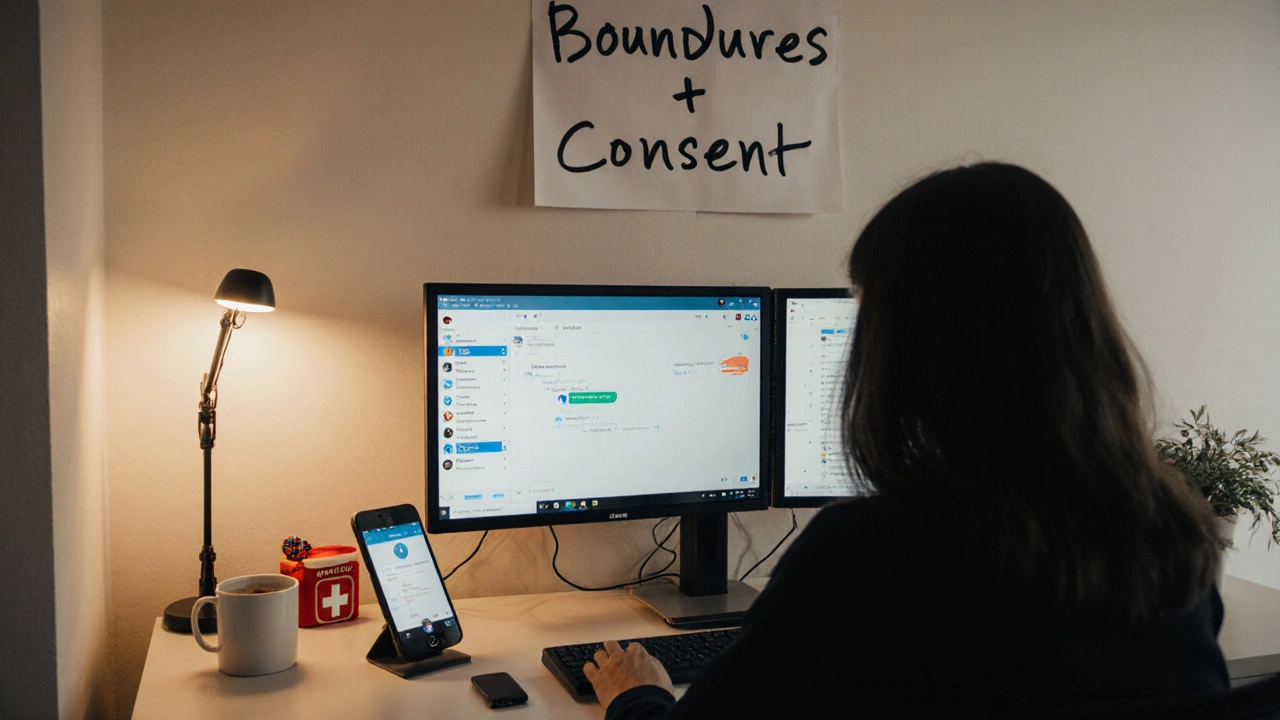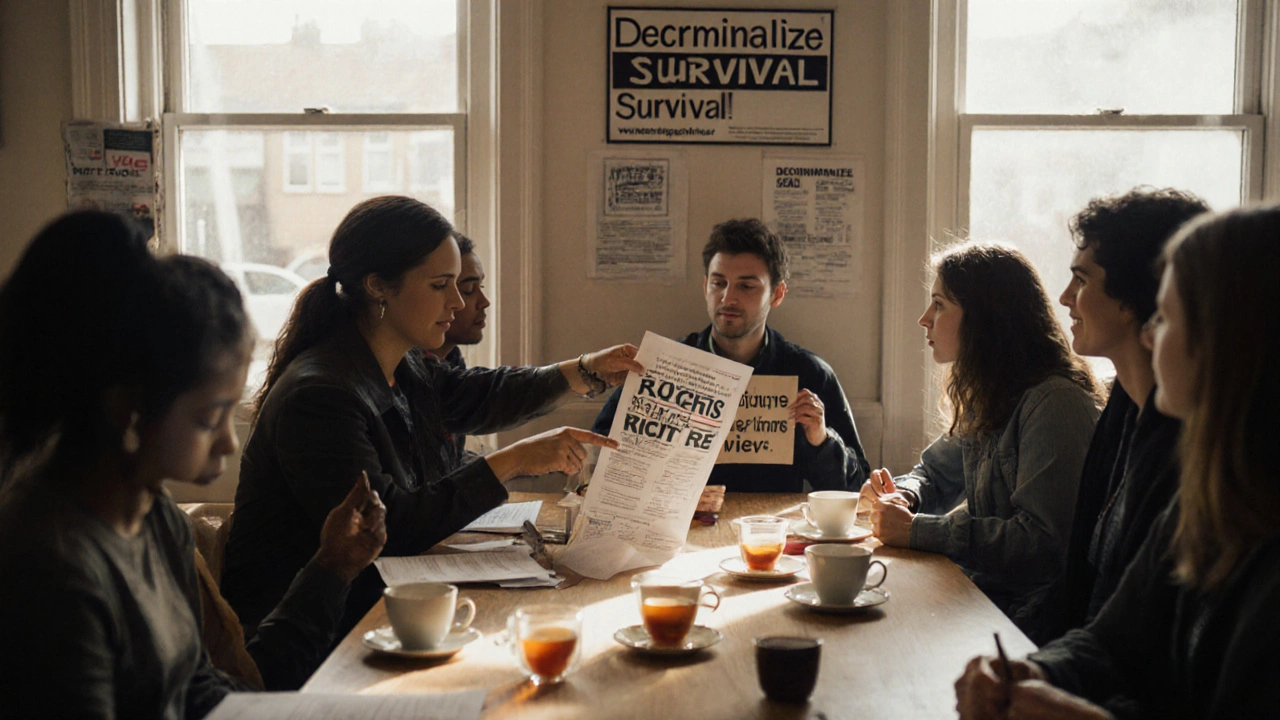The Ethics of Providing Adult Services

Providing adult services isn’t just about transactions-it’s about human dignity, safety, and power. Every time someone offers companionship, intimacy, or sexual services in exchange for money, they’re stepping into a world shaped by law, stigma, and survival. The ethics aren’t abstract. They’re lived every day by people who need to eat, pay rent, or escape violence. So what does it really mean to provide adult services ethically? And who gets to decide?
What Counts as an Adult Service?
Adult services cover a wide range of paid interactions involving intimacy or sexual activity. This includes escorting, webcam modeling, phone sex, dominatrix work, and in-person companionship. It doesn’t include pornography production, which is a separate industry with different legal and labor dynamics.
In the UK, selling sex itself isn’t illegal-but many related activities are. Soliciting in a public place, kerb crawling, operating a brothel, and pimping are all criminalized. That means most sex workers operate in legal grey zones. They can’t advertise openly, share spaces safely, or hire security. The law doesn’t protect them; it pushes them into isolation.
According to the 2023 Home Office report on prostitution in England and Wales, an estimated 60,000 people engage in sex work annually. Around 72% of them report feeling unsafe at least once in the past year. That’s not a failure of morality-it’s a failure of policy.
Autonomy vs. Exploitation: The Core Ethical Tension
The biggest ethical question isn’t whether sex work is wrong-it’s whether the person doing it chose it freely. Autonomy matters. If someone enters sex work because they’ve been trafficked, coerced, or trapped by debt, that’s exploitation. If someone chooses it because they need income, value flexibility, or enjoy the work, that’s self-determination.
A 2022 study by the University of Bristol’s Centre for Social Justice found that 68% of sex workers surveyed said they entered the industry because they couldn’t find other work that paid enough to cover housing and childcare. Only 9% said they were forced. The rest cited reasons like flexible hours, higher pay than retail or care work, or personal empowerment.
When we blur these lines-when we assume all sex work is trafficking-we harm the very people we claim to protect. Criminalization doesn’t stop exploitation; it hides it. It makes it harder for workers to report abuse, access healthcare, or get legal help.
How Legal Frameworks Shape Ethics
Where you are changes everything. In New Zealand, sex work has been fully decriminalized since 2003. Workers can rent apartments, hire drivers, and work together in collectives. Police don’t raid flats. Health services are accessible. A 2021 evaluation by the New Zealand Ministry of Health showed a 60% drop in violent incidents against sex workers and a 90% increase in reporting crimes to police.
In contrast, the UK’s current model-criminalizing clients and third parties while leaving the seller vulnerable-is called the Nordic Model. It’s sold as ‘protective,’ but data from Sweden and Norway shows it hasn’t reduced demand. Instead, it’s driven services underground. Workers now meet clients in cars, parks, or private homes with no witnesses. That’s not safer-it’s riskier.
Legal frameworks don’t just set rules. They send messages. When the state treats sex workers as criminals or victims, it tells society they’re less deserving of rights. That’s not ethics. That’s institutional dehumanization.

Worker Safety and the Role of Technology
Technology has changed how adult services are provided-and how workers protect themselves. Apps like Clarity, Vibe, and SafeSex allow workers to screen clients, share location data, and flag dangerous profiles. Many use encrypted messaging to avoid police surveillance. Some even create public profiles listing their boundaries, rates, and preferred payment methods.
But platforms like OnlyFans and Patreon have created new ethical dilemmas. Are these platforms empowering workers-or extracting profit while offering no labor protections? OnlyFans takes 20% of earnings. Workers pay for their own marketing, insurance, and taxes. There’s no sick pay. No union. No recourse if a client threatens to leak content.
One London-based webcam worker, who asked to remain anonymous, said: “I make more in one night than I did in a week cleaning offices. But if my account gets banned, I lose everything. No appeal. No explanation. That’s not a job. That’s a gamble.”
What Ethical Provision Looks Like in Practice
Ethical adult services aren’t defined by the act-they’re defined by the conditions. Here’s what ethical provision looks like on the ground:
- Consent is ongoing and specific. No pressure. No guilt. No “just this once.” Workers set boundaries and can change them at any time.
- Payment is fair and transparent. Rates are posted. No hidden fees. No last-minute demands for more money.
- Working conditions are safe. Meetings happen in controlled environments. Workers have access to security, transportation, and emergency contacts.
- Legal protection exists. Workers can report threats or violence without fear of arrest.
- Stigma is challenged. Clients are educated. Society doesn’t shame workers for their choices.
These aren’t ideals. They’re basic human rights. And they’re already happening-in collectives like the English Collective of Prostitutes, or peer-led groups in Manchester and Brighton that offer legal advice, health checks, and safe meeting spaces.

Who Benefits When Ethics Are Ignored?
When adult services are criminalized or stigmatized, the winners aren’t victims or society. They’re the people who profit from the chaos.
Drug dealers exploit workers in debt. Traffickers target migrants with no legal status. Tech companies monetize their labor without responsibility. Landlords rent out rooms to sex workers knowing they’re illegal-then evict them if police come knocking.
Meanwhile, the public is told to feel sorry for “victims” or disgusted by “prostitutes.” Neither view sees the person. Neither view offers real help.
Real ethics means recognizing that people in adult services are not broken. They’re navigating a system designed to make them invisible. The solution isn’t rescue. It’s rights.
How to Support Ethical Adult Services
If you believe in dignity, safety, and justice, here’s how to act:
- Support decriminalization. Back organizations like the English Collective of Prostitutes or Sex Workers Outreach Project (SWOP) that campaign for legal reform.
- Don’t assume. Don’t assume every sex worker is exploited. Don’t assume every client is predatory. People are complex.
- Use ethical platforms. If you’re a client, choose services that allow workers to set boundaries, verify identities, and receive direct payment.
- Donate to harm reduction. Groups like The Red Thread in Bristol provide free condoms, STI testing, and mental health support to sex workers.
- Speak up. Challenge jokes, stereotypes, and laws that punish people for surviving.
Change doesn’t come from pity. It comes from solidarity.
Final Thoughts: Ethics Isn’t About Judging-It’s About Protecting
The ethics of providing adult services aren’t about whether sex should be sold. They’re about whether people should be punished for selling it. They’re about whether someone who works 12 hours a day to pay their child’s school fees deserves legal protection. They’re about whether a woman fleeing domestic abuse should be arrested for taking a job that lets her live.
There’s no moral high ground in criminalization. Only suffering. The only ethical path forward is one that puts autonomy, safety, and human rights first-not shame, fear, or outdated laws.
Is selling sex illegal in the UK?
Selling sex itself is not illegal in the UK. However, many activities around it are: soliciting in public, running a brothel, pimping, and paying for sex with someone who is exploited. This creates a legal environment where workers are vulnerable, even if they’re not breaking the law.
Are all sex workers victims?
No. While some people are trafficked or coerced into sex work, many enter it voluntarily. Research shows most sex workers choose it for financial reasons, flexibility, or personal agency. Assuming everyone is a victim ignores their autonomy and makes it harder to support those who actually need help.
What’s the difference between decriminalization and legalization?
Legalization means the government regulates sex work like a business-requiring licenses, health checks, and zoning laws. Decriminalization removes criminal penalties entirely, treating sex work like any other job. Decriminalization, as used in New Zealand, gives workers more control and safety than legalization, which often creates new barriers.
Do clients contribute to exploitation?
Some do-especially those who pressure workers, refuse to use protection, or demand illegal acts. But most clients are ordinary people seeking companionship or intimacy. Criminalizing clients doesn’t stop exploitation-it drives it further underground. The focus should be on identifying traffickers and abusive operators, not punishing every person who pays for sex.
How can I help sex workers safely?
Support organizations that provide legal aid, health services, and housing to sex workers. Donate to groups like The Red Thread or SWOP. Advocate for decriminalization. Avoid stigmatizing language. And never assume someone’s story-ask how you can help, instead of telling them what they need.
If you’re someone who provides adult services, your safety matters. If you’re someone who wants to understand this world better, your curiosity matters. But the only thing that truly changes things is action-quiet, consistent, and rooted in human dignity.


Karan Chugh
November 4, 2025 AT 12:14Let me be clear: this isn't about rights, it's about decency. You can't sanitize exploitation with words like 'autonomy' and 'agency.' People don't choose this because they want to-they choose it because they have no other option. The data you cite ignores the systemic coercion baked into poverty. This isn't empowerment. It's survival with a fancy label.
Mona De Krem
November 6, 2025 AT 05:10ok but what if the whole thing is a government psyop to control women?? like… what if the ‘sex worker rights’ movement is just a way to normalize pedophilia under the guise of ‘consent’?? i saw a video where a 19yo said she ‘loved’ being a cam girl and then her mom cried in the background… that’s not freedom that’s trauma programming 😭
RANJAN JENA
November 7, 2025 AT 17:59Let me tell you something from the streets of Delhi, where women sell flowers and sell themselves because the system has no mercy for either: dignity is not a privilege-it is a birthright. The moment we call someone a ‘prostitute’ or a ‘victim,’ we erase their humanity. They are mothers, daughters, poets, engineers who took a detour because the road was blocked. Decriminalization isn’t about sex-it’s about seeing people. In India, we call this ‘jugaad’-survival with soul. The law doesn’t protect them, but their resilience? That’s sacred.
Ryan Woods
November 8, 2025 AT 23:37While I appreciate the emotional appeal of this article, I must emphasize that the ethical framework presented lacks rigorous epistemological grounding. The conflation of economic necessity with moral agency constitutes a fundamental category error. Furthermore, the statistical references cited fail to account for confounding variables such as regional socioeconomic disparities and self-selection bias. The normalization of commodified intimacy, even under the rubric of ‘autonomy,’ represents a dangerous erosion of societal norms that have historically safeguarded human dignity.
Teresa Bulhoes
November 9, 2025 AT 22:18I’ve worked with survivors of trafficking and sex workers who chose this path-and they’re not the same people. One woman told me she paid for her daughter’s insulin with webcam money. Another was forced into it at 14. You can’t lump them together. The law doesn’t see the difference. But we should. Real ethics means listening to the people who live this, not preaching from a textbook. I’m not here to judge-I’m here to hold space.
Leonie Holly
November 10, 2025 AT 17:37It’s funny how we call it ‘adult services’ like it’s a spa day. But underneath it all, it’s just people trying to survive in a world that doesn’t care. I think we’ve all been invisible at some point. Maybe not like this. But we’ve all felt the weight of being told we don’t matter. This isn’t about sex. It’s about who gets to be seen. And if we’re honest, we’ve all looked away before. Maybe now it’s time to look closer.
Marcia Chrisyolita
November 12, 2025 AT 12:56Let’s be brutally honest: this is a moral collapse disguised as progress. The Nordic Model is not ‘punitive’-it’s protective. You’re normalizing the sexualization of poverty. This isn’t ‘agency.’ This is capitalism’s final stage: turning human bodies into consumable content. The fact that OnlyFans is a $6B industry while nurses can’t afford rent? That’s not innovation. That’s systemic rot. And you’re celebrating it. Shameful.
Chrissy Brown
November 14, 2025 AT 12:20Y’all are overthinking this. 💪 If someone wants to make money being their authentic self-whether that’s dancing, talking, or being intimate-let them! No one gets to decide what another person’s worth is. I’ve known sex workers who are happier than my corporate lawyer friends. They control their hours, their vibe, their income. Stop romanticizing suffering. Empowerment isn’t a buzzword-it’s a lifestyle. 🌟
Matthew Whitehead
November 14, 2025 AT 17:22I used to think this was black and white until I met a woman who worked as a webcam model while studying nursing. She told me she didn’t like the work but needed to pay off her student loans before she could work in a hospital. That’s not exploitation. That’s grit. We don’t need to legalize or criminalize-we need to stop pretending we know what’s best for someone else’s life. Everyone deserves a shot at dignity, even if it looks messy.
Daniel Kim
November 15, 2025 AT 15:18Decriminalize it. End the stigma. Give them rights. That’s it.